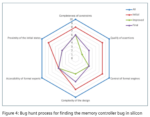When I started in EDA the big three were Daisy, Mentor and Valid (DMV as we called them). Then came Synopsys in 1986 followed by Cadence, which was a clever merger between ECAD (Dracula DRC) and Solomon Design. Daisy and Valid were pushed aside and then there were, “Three dogs hovering over one bowl of dog food, not a pretty site.”… Read More
Electronic Design Automation
The Quest for Bugs: “Deep Cycles”
Verification is a resource limited ‘quest’ to find as many bugs as possible before shipping. It’s a long, difficult, costly search, constrained by cost, time and quality. For a multi-billion gate ASIC,
The search space is akin to a space search; practically infinite
In this article we talk about the quest for bugs at the system-level,… Read More
AUGER, the First User Group Meeting for Agnisys
As a long-time member of the EDA community, I really believe in user groups. EDA tools are complicated beasts, with many options and different ways to use them, and they are constantly evolving. Users interact with their local field applications engineers (FAEs) and sometimes corporate AEs (product specialists) as well on a regular… Read More
Bouncing off the Walls – How Real-Time Radar is Accelerating the Development of Autonomous Vehicles
In the race to get people out of the driver’s seat, the developers of autonomous vehicles (AV) and advanced driving assistance systems (ADAS) have gone off road and into the virtual world.
Using simulation to design, train and validate the brains behind self-driving cars — the neural networks of sensors and systems that perceive… Read More
VersionVault EDA Integration: A Differentiated Value Solution
HCL Technologies is a large, well-established multi-national company with an annual revenue of around $10B and worldwide employee count of well over 150K. They provide valuable solutions to about 20 different industries and related market segments. Over the years, I have had first hand insights to their semiconductor design… Read More
Formal for Post-Silicon Bug Hunting? Makes perfect sense
You verified your product design against every scenario your team could imagine. Simulated, emulated, with constrained random to push coverage as high as possible. Maybe you even added virtualized testing against realistic external traffic. You tape out, wait with fingers crossed for first silicon to come back. Plug it into… Read More
WEBINAR: Pulsic’s Animate Makes Automated Analog Layout a Reality
Many years ago, digital and analog design flows diverged, with digital design benefiting from increasing levels of automation and more importantly separation between the front-end design process and the back-end design process. While digital design still requires linkages between the front and back end, they are well defined… Read More
Library Characterization: A Siemens Cloud Solution using AWS
Pressing demands on compute speeds, storage capacity and rapid access to data are not new to the semiconductor industry. A desire for access to on-demand computing resources have always been there. During pre-cloud-computing era, companies provisioned on-demand compute capacity by procuring high performance computing … Read More
Why Would Anyone Perform Non-Standard Language Checks?
The other day, I was having one of my regular chats with Cristian Amitroaie, CEO and co-founder of AMIQ EDA. One of our subjects was a topic that we discussed last year, the wide range of languages and formats that chip design and verification engineers use these days. AMIQ EDA has put a lot of effort into adding support for many of these… Read More
Reducing Compile Time in Emulation. Innovation in Verification
Is there a way to reduce cycle time in mapping large SoCs to an FPGA-based emulator? Paul Cunningham (GM, Verification at Cadence), Jim Hogan (RIP) and I continue our series on research ideas. As always, feedback welcome.
The Innovation
This month’s pick is Improving FPGA-Based Logic Emulation Systems through Machine Learning… Read More











Memory Innovation at the Edge: Power Efficiency Meets Green Manufacturing